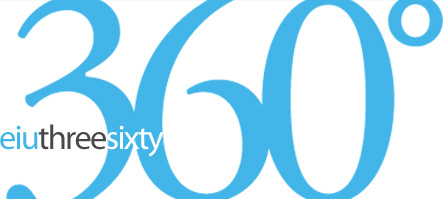
Nestled between more than nine stacks of food ranging from canned carrots to dry cereal, students bag and hand out food at the Charleston Area Churches Food Pantry, where they try to eliminate hunger – one meal at a time.
Similar scenes play out on a regular basis as the student-led EIU Hunger Action Team helps support monthly lunches at a local community center and organizes the ongoing availability of free food bags for anybody on campus who needs them.
The realization that many students go to bed hungry pushed history majors Kate Brown and Samantha Sarich to combat hunger through action and education by forming the Hunger Action Team.
Brown and Sarich's revelation came after hearing the research of sociology assistant professor Michael Gillespie, who has found that many Eastern students are "food insecure" -- meaning they're hungry or at risk of hunger -- and are not getting the essential food they need.
“There are people waking up every day that do not know where their next meal will be,” Gillespie said.
His research shows that 78.3 percent of individuals in the campus area are food insecure, compared to 38.3 percent throughout Coles County.
The purpose of the team is to give individuals who are hungry some relief and knowledge of the resources offered to them, Gillespie said.
“People who are really in need are not thinking about next week or a decade from now; they are thinking about what will get them through today,” Gillespie said.
The idea for the organization began as Gillespie and Rachel Fisher, director of Student Community Service, chatted about social action and hunger.
“We got together one day for coffee at Java, and then all of a sudden, we were just firing off each other and coming up with ideas, which culminated this past November with the Hunger Challenge,” Gillespie said.
The EIU Hunger Challenge, a month dedicated to spreading awareness about hunger throughout the community, prompted Brown and Sarich to get involved.
Sarich helped lead the recent EIU Hunger Challenge, while Brown is the current hunger/poverty intern for Student Community Service, Fisher said.
The active participation in the Hunger Challenge showed Fisher and Gillespie they could get students thinking about hunger more than just one month a year.
“We wanted something where students could get together 12 months out of the year instead of one month,” Gillespie said.
Brown and Sarich said the goals for the organization are education and promotion of the new and old programs. The organization also plans to combat stereotypes associated with hunger.
One of the new initiatives is the Food 2 Go Program, which allows students, faculty and staff members to receive a free bag of food after showing their Panther Cards at the Student Community Service office on the third floor of the MLK Jr. Union. The bags are filled with noodles, water, granola, fruit, soup and V8 Splash. Individuals can pick up a bag as often as needed, Sarich said.
The team also helps support the hot lunches available from 11 a.m. to 1 p.m. on the last Saturday of every month at Standing Stone Community Center at 201 North Sixth St. in Charleston.
In addition, they promote the shuttle bus runs for students from 5:30 to 7 p.m. every Thursday at the Charleston Area Churches Food Pantry, 990 W. State St., Charleston. The shuttle bus picks up students at 5:30 and 6:30 p.m. at the bus stop near the Martin Luther King Jr. University Union.
As the hunger/poverty intern, Brown goes to the food pantry every Thursday evening and works on the ground combating hunger. Her favorite part of working at the pantry is when someone smiles after receiving the food they need.
“This is what I want to do for the rest of my life,” Brown said.

Some of the future ideas for the organization include getting a food pantry on campus and providing more education in the community to debunk poverty stereotypes and make people aware that poverty can easily be hidden, Gillespie said.
“Poverty is the easiest thing to mask about yourself, because you can have clothes for years and can keep them nice,” Gillespie said. “People who are poor are notorious for taking care of certain things so they can present themselves in a different way than the reality.”
When Gillespie gives lectures to the community about poverty, he hears many individuals vilify students because they have nicer cars or clothes then they do, but he said individuals’ bias toward the students is based on false assumptions.
“I have had students that I have tried to help that have been truly hungry,” Gillespie said.
Too many times, Gillespie said, society questions the individual when they are poor, but not the conditions that put them there.
“The ugly reality about poverty is that there is always something to do and always something to address,” Gillespie said. “We could meet every day.”
For more information on the EIU Hunger Action Team, please contact Gillespie at mgillespie@eiu.edu or 581-7107, or Sarich at smsarich@eiu.edu.




